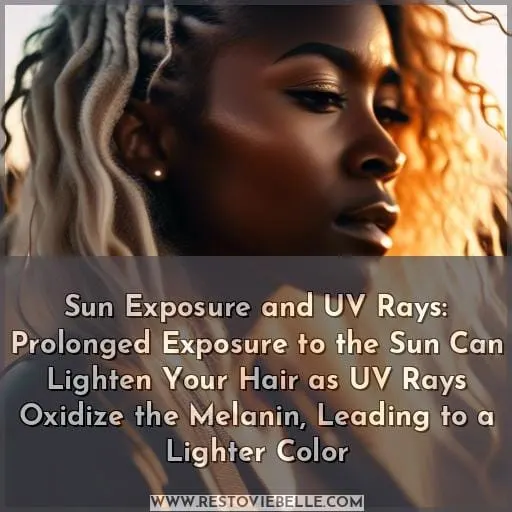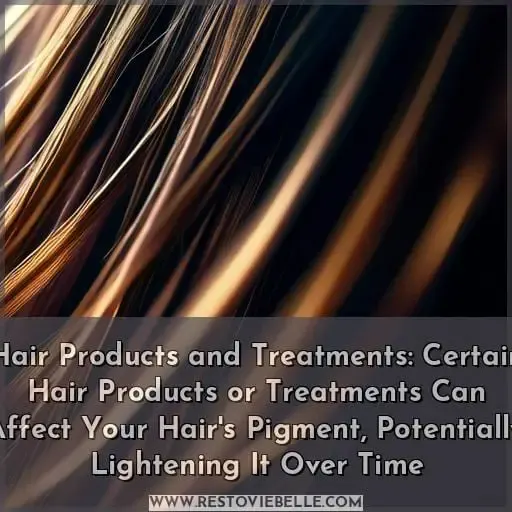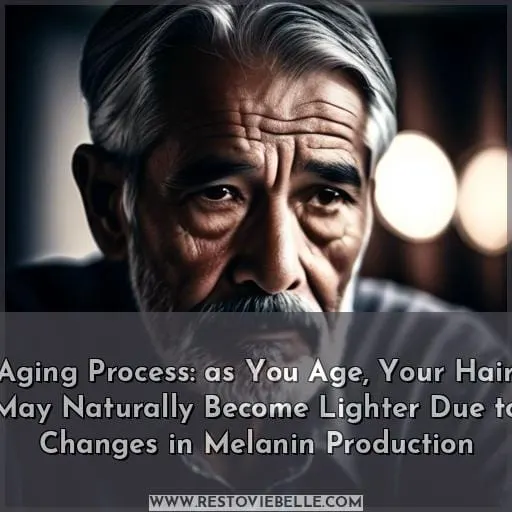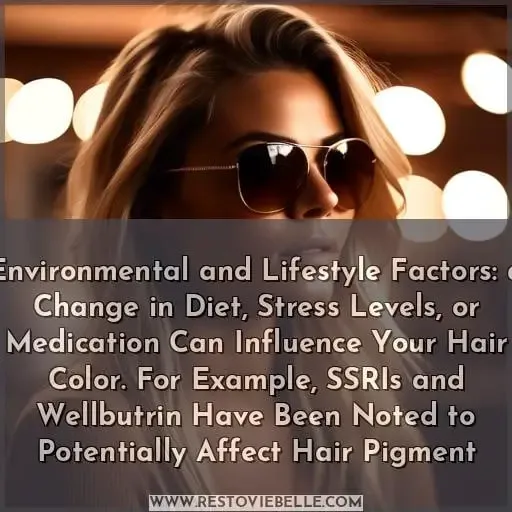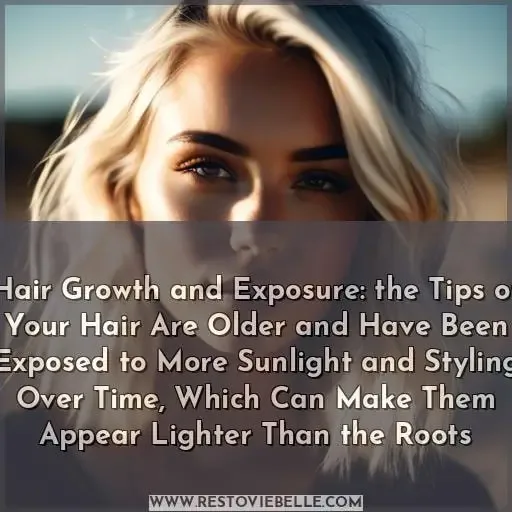This site is supported by our readers. We may earn a commission, at no cost to you, if you purchase through links.
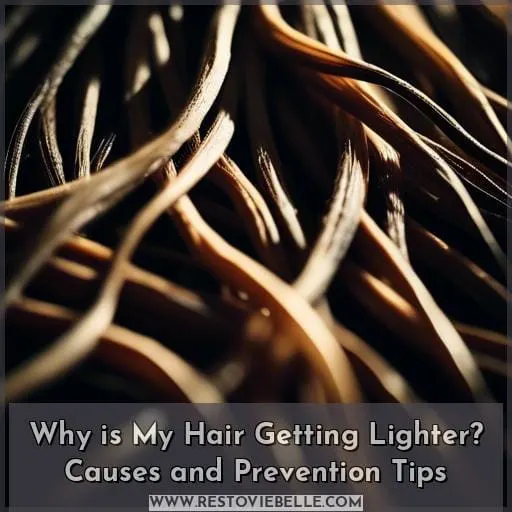 Discovering your hair’s hue subtly shifting can be a surprising journey, often leaving you puzzled and seeking answers.
Discovering your hair’s hue subtly shifting can be a surprising journey, often leaving you puzzled and seeking answers.
Whether it’s the sun’s kiss softening your strands into lighter shades or the silent whisper of time altering your hair’s pigment, understanding the why can bring a sense of control back into your hands.
From the golden glares of summer days to the intricate dance of genetics and age, your hair tells a story of exposure, change, and adaptation.
This article delves into the myriad reasons behind the lightening of your hair, offering insights grounded in the science of trichology.
We’ll explore how UV rays, hair products, aging, and even your lifestyle can play pivotal roles in this transformation, providing you with knowledge and tips to navigate these changes with confidence and care.
Your hair may be getting lighter due to increased sun exposure, which breaks down melanin, or from using certain hair products and treatments.
Table Of Contents
- Key Takeaways
- Sun Exposure and UV Rays: Prolonged Exposure to the Sun Can Lighten Your Hair as UV Rays Oxidize the Melanin, Leading to a Lighter Color
- Hair Products and Treatments: Certain Hair Products or Treatments Can Affect Your Hair’s Pigment, Potentially Lightening It Over Time
- Aging Process: as You Age, Your Hair May Naturally Become Lighter Due to Changes in Melanin Production
- Environmental and Lifestyle Factors: a Change in Diet, Stress Levels, or Medication Can Influence Your Hair Color. For Example, SSRIs and Wellbutrin Have Been Noted to Potentially Affect Hair Pigment
- Hair Growth and Exposure: the Tips of Your Hair Are Older and Have Been Exposed to More Sunlight and Styling Over Time, Which Can Make Them Appear Lighter Than the Roots
- Frequently Asked Questions (FAQs)
- Can hormonal changes during pregnancy or menopause cause my hair to lighten?
- Why does my hair seem to get lighter after I’ve been sick for a while?
- Could the water quality in my home, such as hard water, be making my hair lighter?
- Is it possible for emotional stress or trauma to lead to lighter hair color?
- How does genetics play a role in hair lightening, independent of aging or sun exposure?
- Conclusion
Key Takeaways
- Prolonged sun exposure leads to the oxidation of melanin in the hair, causing it to lighten over time.
- Chlorine from swimming pools and saltwater from the ocean can strip hair of its natural oils, exacerbating the lightening effect of the sun.
- The aging process naturally decreases melanin production in hair follicles, resulting in gradual hair lightening, especially at the tips which are older and have been exposed to more environmental factors.
- Environmental and lifestyle factors, including nutritional deficiencies, hormonal changes, stress, and certain medications, can subtly influence hair color changes.
Sun Exposure and UV Rays: Prolonged Exposure to the Sun Can Lighten Your Hair as UV Rays Oxidize the Melanin, Leading to a Lighter Color
When you step out into the sun, you’re not just soaking up those feel-good rays; you’re also giving your hair a natural highlight session, courtesy of UV rays. Think of the sun as nature’s salon, minus the gossip magazines. These rays work their magic by oxidizing the melanin in your hair, which can lead to a lighter hair color over time.
It’s like your hair is slowly sipping on a bleach cocktail, but instead of a hangover, you end up with sun-kissed locks.
But here’s the twist: while the sun plays its part, other elements like chlorine and saltwater can join the party, turning it into a full-blown color-changing rave. These elements can strip your hair of its natural oils, making the lightening effect even more pronounced.
And if you’re a fan of heat styling or have dabbled in chemical treatments, you’re adding more guests to the party. These processes can open up the hair cuticle, making it easier for your hair to lose its color and embrace that lighter shade.
So, if you’ve noticed your hair getting lighter and wondered if you’re slowly turning into a sun deity, it’s actually a mix of UV rays, your summer pool dives, and maybe a bit of styling magic. It’s all fun and games until you realize your hair might also be sending an SOS for some TLC.
Keep it hydrated, and maybe throw a hat into your summer ensemble. Your hair will thank you for it, and who knows, you might just set a new trend.
Hair Products and Treatments: Certain Hair Products or Treatments Can Affect Your Hair’s Pigment, Potentially Lightening It Over Time
Just as the sun’s rays can subtly shift your hair color, the products and treatments you choose play a pivotal role in the hue of your tresses. Imagine your hair as a canvas, and these products as the artists’ tools, capable of transforming the pigment in ways that range from subtle to striking.
Whether you’re reaching for a bottle of sun-kissed highlights or diving into the world of bleach alternatives, it’s essential to understand the chemical reactions at play.
Hair lightening effects aren’t just about achieving those summer vibes; they’re a dance of chemistry on your strands. Products containing ingredients like hydrogen peroxide or chamomile extract work by oxidizing the melanin in your hair, leading to a lighter shade.
However, this transformation isn’t without its risks. The quest for lighter locks can lead to dryness and damage if not approached with care.
To preserve your hair’s health and color, consider color protection strategies. Opting for sulfate-free shampoos, conditioners rich in moisturizing ingredients, and treatments that seal the hair cuticle can help lock in your desired shade while keeping your hair looking vibrant.
Pigment preservation is key, especially for those who’ve ventured into the realm of color treatments. Regular use of deep conditioning masks and leave-in treatments can provide an extra layer of protection against the elements and styling tools.
Aging Process: as You Age, Your Hair May Naturally Become Lighter Due to Changes in Melanin Production
As you age, your hair’s color can naturally lighten due to shifts in melanin production.
The melanin in your hair follicles decreases over time, leading to a gradual lightening effect. Just like a fine wine, your hair matures with age, embracing its unique journey.
Embrace the silver strands as a badge of wisdom and experience. Remember, it’s not just about the color; it’s about the story each strand tells.
So, let your hair dance in the sunlight, reflecting the chapters of your life with grace and elegance.
Environmental and Lifestyle Factors: a Change in Diet, Stress Levels, or Medication Can Influence Your Hair Color. For Example, SSRIs and Wellbutrin Have Been Noted to Potentially Affect Hair Pigment
Your hair’s color can subtly shift due to various environmental and lifestyle factors, including your diet, stress levels, and the medications you take.
For instance, certain antidepressants like SSRIs and Wellbutrin have been associated with changes in hair pigment.
It’s important to understand that these factors can influence melanin production, which in turn affects the natural color of your hair.
Diet Changes Impact
Your diet can be a secret weapon or an unsuspecting saboteur when it comes to your hair color.
Nutritional deficiencies, like a lack of vitamins and minerals, can leave your locks looking lackluster and even lead to color changes. For instance, if your body is low on iron, you might find your hair not only thinning but also losing its vibrant hue.
Hormonal changes can throw a wrench in your hair’s pigmentation process, and if your thyroid is out of whack, it could be a culprit in altering your hair color.
And let’s not forget gut health – it’s the unsung hero in the saga of your strands. A happy gut can mean a happy head of hair, so consider this your nudge to nurture it.
Stress Affects Melanin
Feeling like your hair’s playing tricks on you, turning lighter as if by magic? It’s not your imagination, and stress might be the sneaky culprit behind the curtain. When life throws you curveballs, your body reacts in more ways than one, including messing with your hair’s melanin, the pigment that gives your hair its color.
Think of stress as a storm cloud over your melanin production, raining down hormones and neurotransmitters like noradrenaline that can lead to a lighter hair color or even premature graying.
It’s a bit like your hair is keeping score of your stress levels, with each strand potentially going lighter as if to say, Remember that super stressful week last month? And it’s not just about the grays; stress can influence your hair color in nuanced ways, thanks to a complex dance between hormones, genetics, and even your immune system.
So, if you’re noticing a change, it might be time to consider whether your lifestyle or even your thyroid is playing a part. While we can’t always control the stress life throws our way, understanding its impact can be the first step in taking back some control over your hair’s hue.
Remember, it’s not just about vanity; it’s about the fascinating ways our bodies respond to our environment and internal states.
Medication Color Influence
Just when you thought stress was the only culprit behind your changing hair color, think again! Medications can be sneaky agents of change, too.
Ever heard of the bleaching effects of certain drugs? Yep, it’s not just a salon thing. Medications, including SSRIs and Wellbutrin, can play a role in lightening your locks, thanks to hormonal changes they may induce.
It’s like your hair is on a chemical rollercoaster, with peroxide effects and color stripping joining the ride. And if you’re eyeing that root touch-up, consider how your meds might be meddling with your melanin.
It’s a complex dance of chemistry and biology, making your hair the canvas for a very personal kind of art. So, before you blame the sun or your shampoo, take a peek inside your medicine cabinet—it might just hold the key to the mystery of your ever-evolving hair hue.
Hair Growth and Exposure: the Tips of Your Hair Are Older and Have Been Exposed to More Sunlight and Styling Over Time, Which Can Make Them Appear Lighter Than the Roots
Ever wondered why the ends of your hair seem to throw a lighter shade party compared to the roots? It’s not just your imagination playing tricks on you. The tips of your hair are indeed older and have been through a lot more than the rest of your mane.
- Sunlight and Styling: Just like your favorite pair of jeans fades with time, your hair undergoes a similar journey. The tips have basked in more sunlight, soaked up UV rays, and have been styled, straightened, and curled more times than you can count. This exposure gradually lightens the color, making the ends look like they’ve been dipped in a summer glow.
- Chlorine and Heat: Remember those pool days and the countless times you’ve blow-dried your hair? Chlorine and heat are like the dynamic duo of color fading. They team up to strip away moisture and pigment from your hair, leaving the tips looking parched and paler.
- Natural Wear and Tear: Just like the oldest leaves on a tree, the oldest parts of your hair show signs of wear and tear. The tips have been with you through thick and thin, literally. They’ve seen more washes, brushes, and ties than the newer strands at the roots, contributing to a lighter appearance.
Understanding this can be a bit of a bummer, especially if you’re aiming for uniform color. But hey, it’s all part of your hair’s natural journey. Embrace the ombre effect or use it as an excuse to experiment with new styles and colors.
Frequently Asked Questions (FAQs)
Can hormonal changes during pregnancy or menopause cause my hair to lighten?
Yes, hormonal changes during pregnancy and menopause can indeed cause your hair to lighten. During pregnancy, the high levels of estrogen can affect your hair’s melanin, potentially leading to lighter hair.
Menopause, on the other hand, brings a decrease in estrogen and an increase in androgen, which can also impact hair color, making it appear lighter or even lead to greying.
Hormones are like the behind-the-scenes crew, subtly tweaking your hair’s appearance without a grand announcement. So, if you’re noticing some new sun-kissed strands or a lighter shade taking over, your body’s hormonal symphony is likely conducting a new hair color score.
Why does my hair seem to get lighter after I’ve been sick for a while?
Feeling under the weather can throw your body for a loop, including your hair! Illness can sap nutrients and shift hormones, leading to lighter locks.
It’s like your mane’s sending an SOS!
Could the water quality in my home, such as hard water, be making my hair lighter?
Oh, the drama of dealing with hard water! It’s like your hair’s own personal soap opera, where the minerals play the villains, turning your luscious locks into a dull, lifeless mess.
Imagine your hair color fading faster than a summer tan, all thanks to the sneaky calcium and magnesium lurking in your water. It’s a plot twist you didn’t see coming, turning your vibrant hues brassy or even orange.
But fear not, for every hero’s journey involves overcoming obstacles. In this case, the hero is you, armed with knowledge and a clarifying shampoo to rescue your hair from the clutches of hard water’s drama.
Is it possible for emotional stress or trauma to lead to lighter hair color?
Emotional stress isn’t just a heartbreaker; it can literally wash the color right out of your hair!
Harvard boffins found that stress can make your mane go gray by depleting pigment-producing cells.
Chill out, and you might just see a color comeback.
How does genetics play a role in hair lightening, independent of aging or sun exposure?
Ever wondered why your locks might be throwing in the towel on their darker days? Genetics is the mastermind behind the scenes, orchestrating the symphony of pigments in your hair.
It’s not just about the well-known MC1R gene; a whole ensemble of genes like ASIP, TYR, and OCA2 play their parts in the hair color concerto, sometimes dialing down the dark eumelanin or amping up the lighter pheomelanin.
So, if you’re noticing a lighter shade without the sun’s spotlight or the silvering touch of time, your genes might just be remixing your hair’s hue.
Conclusion
As the seasons of your life ebb and flow, so too does the color of your hair, painting a vivid tapestry of your experiences, genetics, and the care you lavish upon it.
Understanding why your hair is getting lighter isn’t just about unraveling a mystery; it’s about connecting with the essence of who you are and how you interact with the world around you.
Whether the sun’s embrace has kissed your strands a lighter shade, or the passage of time has woven silver threads through your tresses, each change is a reflection of your journey.
From the products that grace your hair to the stress that tests its resilience, every aspect plays a role in this ever-evolving story.
Embrace these shifts not as mere cosmetic changes, but as markers of life’s rich tapestry, guiding you to nurture your hair with knowledge, understanding, and a touch of science-backed care.

